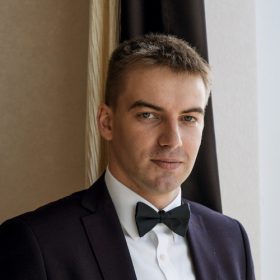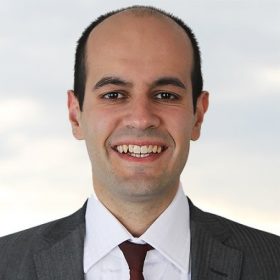Friday 27th March 2020
- Machine Learning on time series, global approach for market data and numerical alternative data
- Innovation in risk management: An effective approach to enterprise data quality management
- How to use data to build effective models?
- Exploring survivorship bias, non-stationarity, and noise to signal ratio and fixes

Andrés Berenguer Alonso:
Market Risk Director, Derivative Valuations Area, Santander
Andrés Berenguer Alonso: Market Risk Director, Derivative Valuations Area, Santander
Andrés Berenguer is currently team director within the derivative valuations area of the Market Risk department in Banco Santander. Since 2009 he has been working on derivative valuations including besides other things, advising on the pricing models of exotic trades, XVA calculation or interest rate curves modelling (basis spreads, collateral, OIS discounting,…). Before working in banking, his experience was in Space and Communications Engineering. He hold a M.Eng. (Laurea) in Telecommunications Engineering from the Miguel Hernández University of Elche, a MBA from the University of Valencia, a M.Sc. in Technologies, Systems and Communications Networks Engineering from the Polytechnic University of Valencia and he is currently working on his PhD in Telecommunications Engineering from the Miguel Hernández University of Elche.
“From Black Box to Glass Box: High-Speed, Blockchain-Based, Look-Back Analysis as a Tool for Understanding & Trusting Artificial Intelligence Decision Trees in Quantitative Finance”

Michael E. Bryant:
Chairman of the Board
Quant Prophets
Michael E. Bryant: Chairman of the Board Quant Prophets & (former Chairman of the Board World Blockchain Foundation (.Net)
Michael E. Bryant: Chairman of the Board, Quant Prophets Michael E. Bryant serves as Chairman of the Board of Quant Prophets, a firm founded in 2015 to research and develop quantitative finance applications of quantum computing, artificial intelligence / machine learning, and blockchain technology for a select group of international banks. He formerly served as the Chairman of the Board of the World Blockchain Foundation(.Net), as CEO of Blockchain Ventures International, and as Publisher and CEO of The Daily News | Blockchain. Throughout his career, he has acquired companies, founded startups, and served on corporate and government Boards. He is a veteran of nine ICO’s, and advises Corporate Boards and Government Ministries on Blockchain strategy and implementation. Michael earned a BSc in Finance & Accounting, an MBA in International Business, and an MA in International Relations. He is a CPA (Certified Public Accountant) and a Certified Blockchain Expert (CBE).
To be confirmed

Ivan Zhdankin:
Associate, Quantitative Analyst, JPMorgan Chase & Co
Ivan Zhdankin: Associate, Quantitative Analyst, JPMorgan Chase & Co
Ivan Zhdankin is a quantitative researcher with experience in diverse areas of quantitative finance, including risk modelling, XVA, and electronic trading across asset classes, including commodity futures and G10 and emerging market currencies. Ivan was consulting various banks in quantitative modeling and has recently joined JP Morgan as a quantitative analyst. He has become one of the first researchers to generate convincing results in electronic alpha with neural nets. He has a solid mathematical background from New Economic School and Moscow State University, where he studied under the celebrated Albert Shiryaev, one of the developers of modern probability theory.

Georgios Papaioannou:
Trading Strategist, Bank of America Merrill Lynch
Georgios Papaioannou: Trading Strategist, Bank of America Merrill Lynch
George Papaioannou, is a VP Trading Strategist within the Scientific Implementation Group of Bank of America Merrill Lynch. A Global quantitative team employing systematic, quantitative and scientifically informed methodologies around execution, portfolio management, and risk management, with emphasis on development of client solutions. George joined BAML in May 2018, following 12 years in energy major Shell, where he worked on a variety of functions. His latest role was in a team of computational science specialists, advising on machine learning, data, cloud, and high performance computing projects. He has previously worked in production operations, oil and gas forecasting, production optimization, reservoir management, development and project execution, for offshore fields in Brunei. The first 5 years of his industry career he worked in R&D as a scientific software developer focusing on scalable solvers and high performance computing. George holds a PhD in Computational Fluid Mechanics from the Massachusetts Institute of Technology, where he also completed two MSc degrees and worked as a post-doctoral associate for a year. He has authored academic articles and acted as referee for several scientific journals.
Presenter to be confirmed

Daniel Rosengarten:
Head of ALM Quantitative Development, Barclays Investment Bank
Daniel Rosengarten: Head of ALM Quantitative Development, Barclays Investment Bank
Daniel Rosengarten is the Head of ALM Quantitative Development at Barclays Investment Bank. Daniel’s previous career history includes time at Morgan Stanley as an ED – Global Quantitative and Structured Solutions Technology, and Citigroup as Global Structured Credit Derivatives IT.
Daniel holds an MBA gained from the University of Arizona, as well as an MIM from Thunderbird School of Global Management.

Alexander Denev:
Head of AI, Financial Services Advisory, Deloitte
Alexander Denev: Head of AI, Financial Services Advisory, Deloitte
Alexander has more than 15 years of experience in finance, financial modelling and machine learning and he is currently Head of AI – Financial Services Advisory in Deloitte. Prior to joining Deloitte, he led the Quantitative Research & Advanced Analytics at IHS Markit where he created and maintained a center of excellence.
He has written several papers and two books on topics ranging from stress testing and scenario analysis to asset allocation. He has provided thought leadership engagements for conferences, journals and global forums. He also worked as a senior advisor to Risk Dynamics, an arm of McKinsey & Company. Previously he was Director of Risk Models at the Royal Bank of Scotland, where his responsibilities included development of the stress testing methodologies and credit models, and a Fixed Income Structurer for a front office desk. He has also held roles at the European Investment Bank and the European Investment Fund and has participated in the engineering of both the European Financial Stability Facility and the European Stability Mechanism.
Alexander Denev attained his Master of Science degree in Physics with a focus on Artificial Intelligence from the University of Rome, Italy, and he holds a degree in Mathematical Finance from the University of Oxford, UK, where he continues as a visiting lecturer.
Friday 27th March 2020
- Machine Learning on time series, global approach for market data and numerical alternative data
- Innovation in risk management: An effective approach to enterprise data quality management
- How to use data to build effective models?
- Exploring survivorship bias, non-stationarity, and noise to signal ratio and fixes

Andrés Berenguer Alonso:
Market Risk Director, Derivative Valuations Area, Santander
Andrés Berenguer Alonso: Market Risk Director, Derivative Valuations Area, Santander
Andrés Berenguer is currently team director within the derivative valuations area of the Market Risk department in Banco Santander. Since 2009 he has been working on derivative valuations including besides other things, advising on the pricing models of exotic trades, XVA calculation or interest rate curves modelling (basis spreads, collateral, OIS discounting,…). Before working in banking, his experience was in Space and Communications Engineering. He hold a M.Eng. (Laurea) in Telecommunications Engineering from the Miguel Hernández University of Elche, a MBA from the University of Valencia, a M.Sc. in Technologies, Systems and Communications Networks Engineering from the Polytechnic University of Valencia and he is currently working on his PhD in Telecommunications Engineering from the Miguel Hernández University of Elche.
“From Black Box to Glass Box: High-Speed, Blockchain-Based, Look-Back Analysis as a Tool for Understanding & Trusting Artificial Intelligence Decision Trees in Quantitative Finance”

Michael E. Bryant:
Chairman of the Board
Quant Prophets
Michael E. Bryant: Chairman of the Board Quant Prophets & (former Chairman of the Board World Blockchain Foundation (.Net)
Michael E. Bryant: Chairman of the Board, Quant Prophets Michael E. Bryant serves as Chairman of the Board of Quant Prophets, a firm founded in 2015 to research and develop quantitative finance applications of quantum computing, artificial intelligence / machine learning, and blockchain technology for a select group of international banks. He formerly served as the Chairman of the Board of the World Blockchain Foundation(.Net), as CEO of Blockchain Ventures International, and as Publisher and CEO of The Daily News | Blockchain. Throughout his career, he has acquired companies, founded startups, and served on corporate and government Boards. He is a veteran of nine ICO’s, and advises Corporate Boards and Government Ministries on Blockchain strategy and implementation. Michael earned a BSc in Finance & Accounting, an MBA in International Business, and an MA in International Relations. He is a CPA (Certified Public Accountant) and a Certified Blockchain Expert (CBE).

Saeed Amen
Founder: Cuemacro
Saeed Amen: Founder: Cuemacro
Saeed has a decade of experience creating and successfully running systematic trading models at Lehman Brothers and Nomura. He is the founder of Cuemacro, Cuemacro is a company focused on understanding macro markets from a quantitative perspective. He is the author of ‘Trading Thalesians – What the ancient world can teach us about trading today’ (Palgrave Macmillan), and graduated with a first class honours master’s degree from Imperial College in Mathematics& Computer Science.
In this talk, we give a sneak peek of The Book of Alternative Data, which is to be published in early 2020.
We briefly discuss some of the challenges when using alternative such as structuring it and quantifying its value, as well as the risks involved.
We talk about some of the risks associated with alternative data and how to mitigate them
We’ll go through a few of the use cases from book.
These include satellite imagery to model retailers earnings per share and news data to understand FX volatility around central bank meetings.

Saeed Amen
Founder: Cuemacro
Saeed Amen: Founder: Cuemacro
Saeed has a decade of experience creating and successfully running systematic trading models at Lehman Brothers and Nomura. He is the founder of Cuemacro, Cuemacro is a company focused on understanding macro markets from a quantitative perspective. He is the author of ‘Trading Thalesians – What the ancient world can teach us about trading today’ (Palgrave Macmillan), and graduated with a first class honours master’s degree from Imperial College in Mathematics& Computer Science.
Abstract: To gain an edge in the markets quantitative hedge fund managers require automated processing to quickly extract actionable information from unstructured and increasingly non-traditional sources of data. The nature of these “alternative data” sources presents challenges that are comfortably addressed through Machine Learning techniques. We illustrate use of AI and ML techniques that help extract derived signals that have significant risk premium and lead to profitable trading strategies.
This talk will cover the following topics:
- The broad application of machine learning in finance
- Extracting sentiment from textual data such as news stories and social media content using machine learning algorithms, filter sentiment using topics mentioned in the stories to fine tune the trading signal.
- Construction of scoring models and factors from complex data sets such as supply chain network, options prices and ESG (Environmental, Social and Governance)
- Use of Alternative data such as extreme weather (Cyclone, Snowfall) to quantify impact on companies that own retail stores and factories (geolocational).
- Machine Learning techniques for asset pricing, e.g. learning the complex quant models (PDE, monte carlo) via machine learning approach for an efficient pricing of derivative securities.

Arun Verma:
Quantitative Research Solutions, Bloomberg, LP
Arun Verma: Quantitative Research Solutions, Bloomberg, LP
Dr. Arun Verma joined the Bloomberg Quantitative Research group in 2003. Prior to that, he earned his Ph.D from Cornell University in the areas of computer science & applied mathematics. At Bloomberg, Mr. Verma’s work initially focused on Stochastic Volatility Models for Derivatives & Exotics pricing and hedging. More recently, he has enjoyed working at the intersection of diverse areas such as data science (for structured & unstructured data), innovative quantitative & machine learning methods and finally interactive visualizations to help reveal embedded signals in financial data.
Presenter to be confirmed
- Portfolio optimization from a risk management point of view
- Eligible risk optimization strategies
- Optimization metaheuristics and evolutionary algorithms
- Application to simple and real test cases
Abstract
We face up to the portfolio optimization problem from a trading and risk management point of view. Given a generic portfolio of financial instruments, we look for optimal trading strategies based on eligible liquid market instruments able to optimize risk and return figures, respecting both trader view on future market scenarios and risk management constraints. We use global stochastic optimization metaheuristics based on different evolutionary algorithms, possibly supervised by machine learning techniques to reduce the computational effort. We apply our approach to both simplified and realistic trading portfolios including many different financial instruments, finding that appropriate tuning of the optimization’s parameters allows to find interesting and viable optimization strategies.

Marco Bianchetti:
Head of Fair Value Policy, Intesa Sanpaolo
Marco Bianchetti: Head of Fair Value Policy, Intesa Sanpaolo
Marco Bianchetti joined the Market Risk Management area of Intesa Marco joined the Financial and Market Risk Management area of Intesa Sanpaolo in 2008. His work covers pricing and risk management of financial instruments across all asset classes, with a focus on new products development, model validation, model risk management, interest rate modelling, funding and counterparty risk, fair and prudent valuation, applications of Quasi Monte Carlo in finance. He is in charge of the global Fair Value Policy of Intesa Sanpaolo group since Nov. 2015. Previously he worked for 8 years in the front office Financial Engineering area of Banca Caboto (now Banca IMI), developing pricing models and applications for interest rate and inflation trading desks. He is adjunct professor of Interest Rate Models at University of Bologna since 2015, and a frequent speaker at international conferences and trainings in quantitative finance. He holds a M.Sc. in theoretical nuclear physics and a Ph.D. in theoretical condensed matter physics.
.png)
Marco Scaringi:
Quant Risk Analyst, Fair Value Policy Office, Intesa Sanpaolo
Marco Scaringi: Quant Risk Analyst, Fair Value Policy Office, Intesa Sanpaolo
Marco Scaringi joined the Financial and Market Risk Management area of Intesa Sanpaolo in 2017 as quantitative analyst in the Fair Value Policy Office. His work focuses on interest rate models, XVAs, financial bubble analysis and portfolio optimization.
He holds a M.Sc. in theoretical physics from University of Milan, with a thesis on advanced statistical mechanics techniques applied to the description and detection of financial bubbles through optimization heuristics. He also holds a post lauream degree Executive Course of Quantitative Finance from MIP, Graduate School of Business, Polytechnic of Milan, with a thesis concerning interest rate and XVAs modelling.

Alexander Denev:
Head of AI, Financial Services Advisory, Deloitte
Alexander Denev: Head of AI, Financial Services Advisory, Deloitte
Alexander has more than 15 years of experience in finance, financial modelling and machine learning and he is currently Head of AI – Financial Services Advisory in Deloitte. Prior to joining Deloitte, he led the Quantitative Research & Advanced Analytics at IHS Markit where he created and maintained a center of excellence.
He has written several papers and two books on topics ranging from stress testing and scenario analysis to asset allocation. He has provided thought leadership engagements for conferences, journals and global forums. He also worked as a senior advisor to Risk Dynamics, an arm of McKinsey & Company. Previously he was Director of Risk Models at the Royal Bank of Scotland, where his responsibilities included development of the stress testing methodologies and credit models, and a Fixed Income Structurer for a front office desk. He has also held roles at the European Investment Bank and the European Investment Fund and has participated in the engineering of both the European Financial Stability Facility and the European Stability Mechanism.
Alexander Denev attained his Master of Science degree in Physics with a focus on Artificial Intelligence from the University of Rome, Italy, and he holds a degree in Mathematical Finance from the University of Oxford, UK, where he continues as a visiting lecturer.

